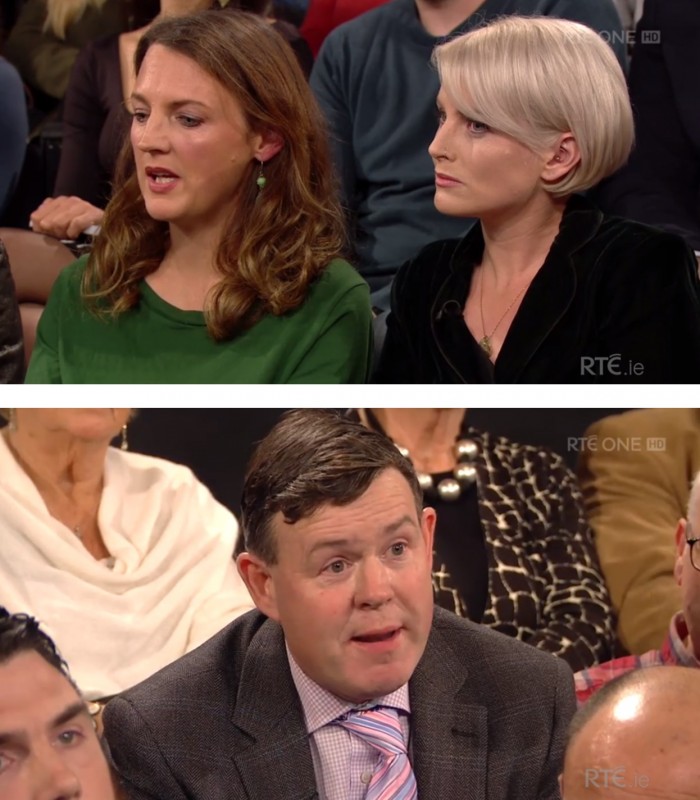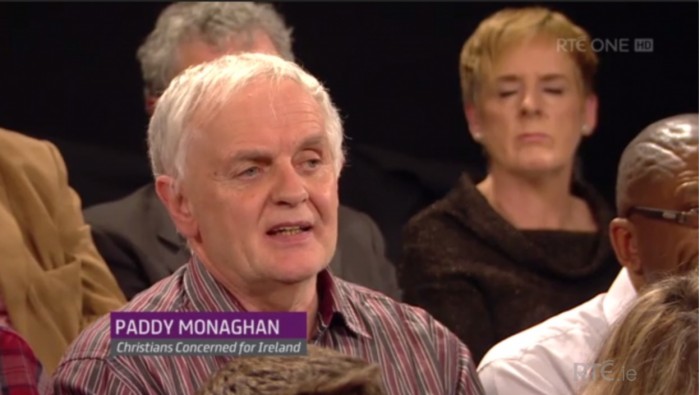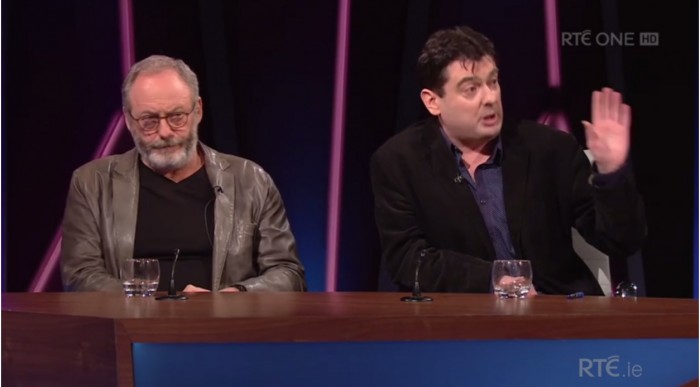From top: Judy Kelly and Sinéad Kennedy, who created the documentary The Crossing; James Reynolds, of The National Party; and Paddy Monaghan, of Christians Concerned for Ireland; Actor Liam Cunningham and Irish Independent columnist Ian O’Doherty.
Seeking an adult debate on the refugee crisis?
Look away now.
Last night.
On RTÉ One’s Claire Byrne Live.
The show’s panel – which included Minister of State with Responsibility for Defence Paul Kehoe, actor Liam Cunningham, who has recently visited refugee camps in Jordan and Greece, and Irish Independent columnist Ian O’Doherty – discussed the Irish Defence Forces’ rescue operations in the Mediterranean off the coast of Libya.
The discussion following the broadcast of The Crossing, a documentary by Sinead Kennedy and Judy Kelly in which they boarded the LÉ Samuel Beckett for one month and documented the rescue operations carried out by the Irish Defence Forces.
Readers may wish to note that, according to official figures from the UNHCR, 352, 822 people, seeking protection, have arrived in Europe by sea so far this year – compared to 1,015,078 in total last year.
It’s believed 4,742 have died or gone missing so far this year – however it is impossible to know how many people have died/disappeared without trace.
From last night’s show:
Large tay.
Claire Byrne: “There were two things that struck me – one, that the boats are sometimes sent away with only 50 miles worth of fuel, which is useless, and also that they’re giving, the smugglers are giving the phone numbers of the rescue ships to the people on those boats. So, are the smugglers relying on the likes of the Irish Navy service to pick up the pieces here? And, if so, should we be doing that?”
Sinead Kennedy: “Well, I mean I guess they are to a certain extent. But not every boat or PID, as they call them, a ‘platform in distress’, actually did have a satellite phone which, for me, was the more frightening thing. We were watching these horrendous rescues, harrowing scenes, you know, unfolding before your eyes and that was one thing but to think that the 299, the last rescue that we featured on the documentary tonight, not one of those single PIDs, there was three of them, of those rubber boats out in the sea that day, none of them had a satellite phone and they didn’t have a clue that they were meant to call anyone. And the ship stumbled upon them by complete mistake and you’re just thinking that’s 299 people that would have perished had, you know, the Irish Navy not been there, of the Defence Forces, sorry, and they wouldn’t even have been a statistic because who would have known that they were at the bottom of the Med, you know, a few hours later, the weather turned and they really wouldn’t have made it and they didn’t have enough fuel, as you say, to even turn back so it’s just frightening to think that people are actually doing this and this is happening absolutely we need to be out there. We need to be doing something.”
Byrne: “So you think those rescue missions should continue, regardless of the fact that the service might be being used by the smugglers?”
Sweeney: “Personally, yeah, I do think we need to be out there. I mean, there’s the argument that the Italians last year [sic] stopped everything after hearing a lot of negative commentary about what they are doing and are they just, you know, influencing people to come out and they’re gonna get picked up, etc, so they stopped and about 800 people died in one day, so I mean…”
Judy Kelly: “People will keep coming. The thing is Libya is a really, what really was shocking was to hear the stories of people’s experience in Libya and I think, to some degree, people are actually fleeing Libya as much as they are trying to go to Europe. I mean it really seems a terribly difficult place, so I think that they would be leaving anyway, to be honest, whether there’s ships there to rescue them.”




